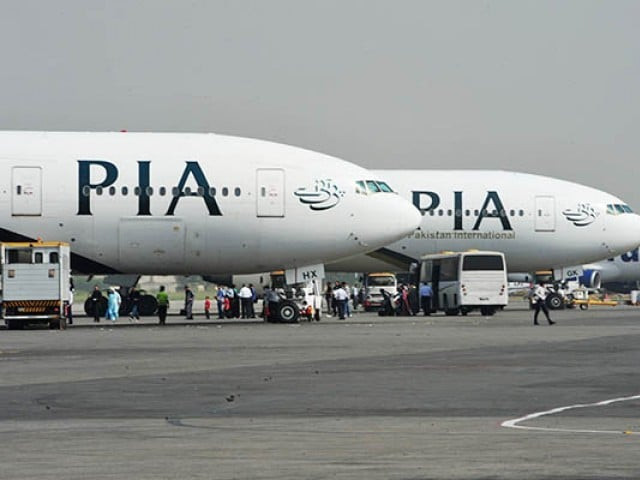Another chance: Govt extends sovereign guarantees for defaulting PIA
Investors agree to roll over entire debt till October 2019

After PIA’s inability to return the debt, investors had agreed to extend the deadline until October 2014. PHOTO: FILE
The federal government on Wednesday extended sovereign guarantees for a loan of Rs6.8 billion for another five years after Pakistan International Airlines (PIA) defaulted on payments to Sukuk (Islamic bond) investors, which were due last year.
The decision to extend the sovereign guarantees was taken by the Economic Coordination Committee (ECC) of the cabinet amid a worsening financial condition of the national flag carrier. The loan had been acquired in December 2009 and the principal amount was due to be repaid by December 2013. After PIA’s inability to return the debt, investors had agreed to extend the deadline until October 2014.
Read: PIA operates first A-320 flight to Skardu
However, PIA again defaulted and the investors have now agreed to roll over the entire debt until October 2019, according to the finance ministry. PIA will pay interest equivalent to six-month Karachi Interbank Offered Rate (Kibor) plus 1.75%.
In the first quarter of the current calendar year, PIA paid Rs3.37 billion in interest on over Rs129.7 billion loans that it owed to various domestic and international investors, according to the company’s balance sheet.
By the end of March, PIA owed Rs33.4 billion in long-term financing facility and Rs59.5 billion in short-term debt. In addition to this, Rs17.1 billion of long-term financing has matured while another Rs19.6 billion in terms of finance certificates and Sukuk was also due.
By the end of the first quarter of 2015, the national flag carrier’s financial condition had worsened, as the airline added another Rs1.23 billion to its cumulative losses despite the fuel cost falling to almost half. Against Rs150.5 billion worth of assets, PIA’s liabilities have now increased to Rs297.4 billion, according to the balance sheet. The government has been making half-hearted attempts to privatise the air carrier and has so far missed three deadlines. The next deadline to sell at least 26% shares is December 2015.
Sugar subsidy
The ECC refused to give further subsidy on the essential items sold at utility stores under the Ramazan package. The Ministry of Industries had sought Rs300 million additional subsidy for the purchase of sugar, as stocks at the utility stores were depleting fast.
However, the ECC turned down the request on the ground that the Utility Stores Corporation did not have sufficient time to procure the commodity. It has already approved a Rs1.5-billion Ramazan package for the sale of essential commodities at the utility stores at subsidised rates.
The ECC took notice of media reports about the quality and non-availability of products at the utility stores, according to a handout issued by the Ministry of Finance. The USC managing director clarified that all stores had been well stocked and they had never compromised on quality of the products.
Read: Another PIA flight to bring stranded Pakistanis from Yemen
ECC Chairman Ishaq Dar, who is also the Finance Minister, directed the industries secretary to verify the facts.
The ECC gave approval to the sale of lint cotton purchased by the Trading Corporation of Pakistan (TCP) during 2014-15. The TCP will sell its stocks through a national and international competitive bidding process. It will fix a reserve price and bids below that price will not be accepted.
On a proposal moved by the Ministry of Petroleum and Natural Resources, the ECC directed the Oil and Gas Regulatory Authority to establish a comprehensive mechanism for the collection of regulatory duty on crude oil and petroleum products.
The government has slapped the duty on petroleum products and the ministry has proposed that the petrol price should be increased by Rs1 per litre and diesel price by Rs1.20 per litre to pass on the impact to the end-consumers.
The ECC constituted a committee, which will determine a mechanism to pass on the impact to consumers after Dar directed that the levy should not be borne by the oil marketing companies and refineries.
Published in The Express Tribune, July 9th, 2015.
Like Business on Facebook, follow @TribuneBiz on Twitter to stay informed and join in the conversation.



















COMMENTS
Comments are moderated and generally will be posted if they are on-topic and not abusive.
For more information, please see our Comments FAQ